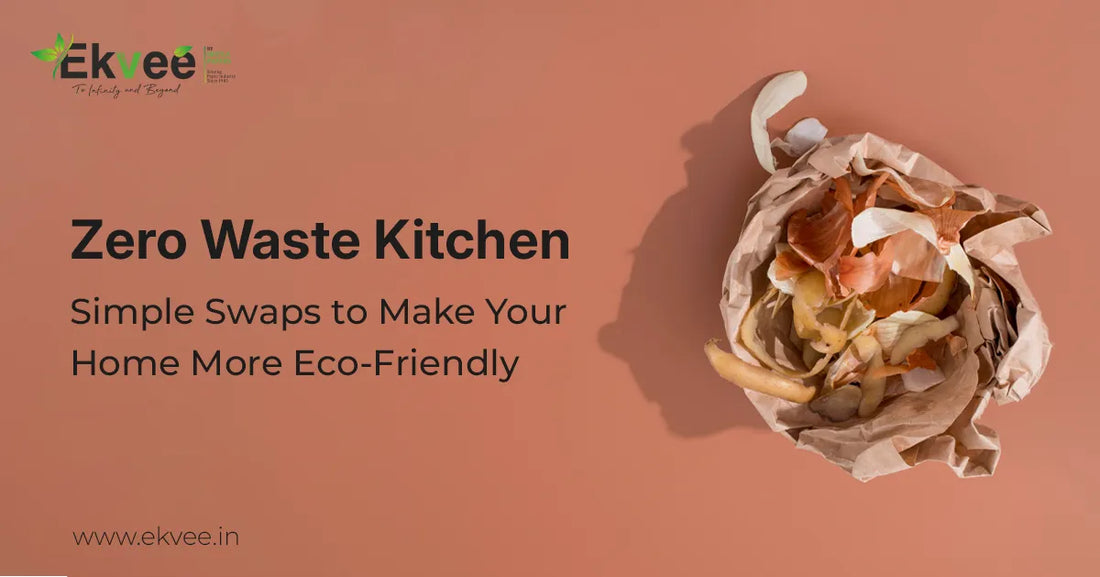
Zero Waste Kitchen: Simple Swaps to Make Your Home More Eco-Friendly
Share
Sustainability starts at home, and one of the easiest places to make an impact is in your kitchen. From single-use plastics to excessive food waste, our daily kitchen habits contribute significantly to environmental damage. But with a few simple swaps, you can turn your kitchen into a zero-waste, eco-friendly space. Here’s how you can get started.
1. Swap Plastic Wrap for Paper Based Food Wraps
Traditional plastic wraps are non-biodegradable and can take hundreds of years to break down. Instead, opt for Ekvee Foodwrap, a food-safe, paper-based alternative that keeps your food fresh while being better for the environment. Unlike plastic, Ekvee’s food wraps are biodegradable and free from harmful chemicals, making them a safer choice for your family.
Read this blog to know more about 5 Healthy Ways to Store Food Without Plastic Wrap.
2. Say No to Single Use Plastic Bags
Plastic grocery bags and zip-lock bags contribute massively to landfill waste. Instead, switch to:
Reusable cloth bags for grocery shopping.
- Glass or stainless steel containers for food storage.
- Silicone food pouches as an alternative to plastic zip-lock bags.
- Eco-friendly paper bags as a sustainable alternative.
To know more, read this blog on Eco-Friendly Paper Packaging | Why It’s the Future of Sustainability.
3. Choose Compostable Dish Sponges and Brushes
Most kitchen sponges are made from plastic and shed microplastics into the water. Replace them with:
- Loofah sponges made from natural fibers.
- Bamboo dish brushes that are durable and compostable.
- Washable cotton cloths for cleaning instead of disposable paper towels.
4. Reduce Food Waste with Smart Storage
Did you know that nearly one-third of all food produced globally is wasted? Reduce food waste by:
- Meal planning to buy only what you need.
- Using airtight glass jars to extend the shelf life of dry goods.
- Storing vegetables properly (e.g., herbs in water, potatoes in a dark place) to prevent spoilage.
Check out our detailed guide on storing coriander leaves to keep them fresh for a longer duration.
5. Ditch Plastic Straws and Cutlery
Plastic cutlery and straws are among the most common ocean pollutants. Instead, choose:
- Stainless steel or bamboo straws that can be reused.
- Wooden or metal cutlery for on-the-go meals.
- Compostable cutlery for picnics and parties.
6. Switch to Sustainable Cleaning Products
Many dish soaps and cleaners contain harsh chemicals that harm the environment. Opt for:
- Eco-friendly dishwashing liquids that are biodegradable.
- DIY natural cleaners using vinegar, baking soda, and lemon.
- Refillable cleaning products to reduce plastic packaging waste.
7. Invest in Reusable Coffee Filters and Tea Infusers
If you’re a coffee or tea lover, consider these eco-friendly swaps:
- A stainless steel or cloth coffee filter instead of paper ones.
- Loose-leaf tea with a reusable infuser instead of tea bags (many tea bags contain plastic!).
8. Compost Your Kitchen Scraps
Instead of throwing away food scraps, start composting! Composting helps reduce landfill waste while creating nutrient-rich soil for your plants. You can compost:
- Fruit and vegetable peels
- Coffee grounds and eggshells
- Tea leaves and unbleached tea bags
Final Thoughts
Creating a zero-waste kitchen is all about making small, conscious choices that lead to a big impact. By switching to sustainable products like Ekvee Foodwrap and reducing plastic waste, you not only protect the environment but also create a healthier home. Start with one swap today, and soon, eco-friendly living will become second nature!
Ready to make your kitchen more sustainable? Explore our range of eco-friendly food wraps.
